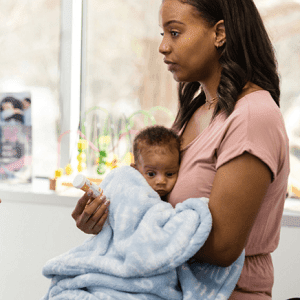Postpartum depression is rising across the U.S., but for Black women, the crisis is deepening. Since 2010, the rate of postpartum depression among Black mothers has nearly tripled, reaching almost 25% by 2021. Yet, they remain 46% less likely to be screened and far less likely to receive treatment compared to white women.
Kay Matthews knows this disparity firsthand. After the stillbirth of her daughter in 2013, she was released from the hospital with no support, no follow-up, and no acknowledgment of her trauma. “I got no pamphlets, no follow-up information, nothing,” she said. Her grief spiraled into postpartum depression, but no one diagnosed her. “Simply because they looked at my birth outcome,” she said.
Matthews later founded the Shades of Blue Project, a nonprofit supporting women with postpartum depression. Her experience, she says, “made me realize how prevalent racism is within the healthcare system.”
Dr. Joy Baker, an obstetrician in rural Georgia, also learned the hard way. One of her patients, overwhelmed by untreated postpartum depression, died by suicide. “It just wasn’t on my radar,” Baker admitted. Mental health conditions like depression and anxiety now account for 23% of maternal deaths, according to the CDC.
With Medicaid covering nearly half of all births in states like Georgia, upcoming federal cuts could devastate access to care. “We will go backwards,” Baker warned. Matthews added, “The impact for what’s to come is going to be astronomical.”
See: “Black Women Often Need More Help Fighting Postpartum Depression” (July 17, 2025)


